- Home
- Howard Pyle
The Merry Adventures of Robin Hood Page 6
The Merry Adventures of Robin Hood Read online
Page 6
“Now we will lie here in ambush until we can get news, for it doth behoove us to be cunning and wary if we would bring our friend, Will Stutely, off from the Sheriffs clutches.”
Robin and his men come to Nottingham Town, and do lie in ambush till that they can get news.
So they lay hidden a long time, until the sun stood high in the sky. The day was warm and the dusty road was bare of travelers, except an aged palmer who walked slowly along the highroad that led close beside the gray castle wall of Nottingham Town. When Robin saw that no other wayfarer was within sight, he called young David of Doncaster, who was a shrewd man for his years, and said to him, “Now get thee forth, young David, and speak to yonder palmer that walks beside the town wall, for he hath come but now from Nottingham Town, and may tell thee news of good Stutely, perchance.”
So David strode forth, and when he came up to the pilgrim, he saluted him and said: “Good morrow, holy father, and canst thou tell me when Will Stutely will be hanged upon the gallows tree? I fain would not miss the sight, for I have come from afar to see so sturdy a rogue hanged.”
“Now, out upon thee, young man,” cried the Palmer, “that thou shouldst speak so when a good stout man is to be hanged for nothing but guarding his own life!” and he struck his staff upon the ground in anger. “Alas, say I, that this thing should be! for even this day, toward evening, when the sun falleth low, he shall be hanged, fourscore rods from the great town gate of Nottingham, where three roads meet; for there the Sheriff sweareth he shall die as a warning to all outlaws in Nottinghamshire. But yet, I say again, Alas! for, though Robin Hood and his band may be outlaws, yet he taketh only from the rich and the strong and the dishonest man, while there is not a poor widow nor a peasant with many children, nigh to Sherwood, but has barely-flour enough all the year long through him. It grieves my heart to see one as gallant as this Stutely die, for I have been a good Saxon yeoman in my day, ere I turned palmer, and well I know a stout hand and one that smiteth shrewdly at a cruel Norman or a proud abbot with fat money-bags. Had good Stutely’s master but known how his man was compassed about with perils, perchance he might send succor to bring him out of the hand of his enemies.”
“Ay, marry, that is true,” cried the young man. “If Robin and his men be nigh this place, I wot right well they will strive to bring him forth from his peril. But fare thee well, thou good old man, and believe me, that, if Will Stutely die, he shall be right well avenged.”.
Then he turned and strode rapidly away; but the Palmer looked after him, muttering, “I wot that youth is no country hind that hath come to see a good man die. Well, well, perchance Robin Hood is not so far away but that there will be stout doings this day.” So he went upon his way, muttering to himself.
When David of Doncaster told Robin Hood what the Palmer had said to him, Robin called the band around him and spoke to them thus:
“Now let us get straightway into Nottingham Town, and mix ourselves with the people there; but keep ye one another in sight, pressing as near the prisoner and his guards as ye can, when they come outside the walls. Strike no man without need, for I would fain avoid bloodshed, but if ye do strike, strike hard, and see that there be no need to strike again. Then keep all together until we come again to Sherwood, and let no man leave his fellows.”
David of Doncaster brings news of Will Stutely unto Robin Hood.
The sun was low in the western sky when a bugle-note sounded from the castle wall. Then all was bustle in Nottingham Town and crowds filled the streets, for all knew that the famous Will Stutely was to be hanged that day. Presently the castle gates opened wide and a great array of men-at-arms came forth with noise and clatter, the Sheriff, all clad in shining mail of linked chain, riding at their head. In the midst of all the guard, in a cart, with a halter about his neck, rode Will Stutely. His face was pale with his wound and with loss of blood, like the moon in broad daylight, and his fair hair was clotted in points upon his forehead, where the blood had hardened. When he came forth from the castle he looked up and he looked down, but though he saw some faces that showed pity and some that showed friendliness, he saw none that he knew. Then his heart sank within him like a plummet of lead, but nevertheless he spoke up boldly.
“Give a sword into my hand, Sir Sheriff,” said he, “and wounded man though I be, I will fight thee and all thy men till life and strength be gone.”
Will Stutely asketh the Sheriff for a sword to fight withal, which the Sheriff will not give him.
“Nay, thou naughty varlet,” quoth the Sheriff, turning his head and looking right grimly upon Will Stutely, “thou shalt have no sword but shall die a mean death, as beseemeth a vile thief like thee.”
“Then do but untie my hands and I will fight thee and thy men with no weapon but only my naked fists. I crave no weapon, but let me not be meanly hanged this day.”
Then the Sheriff laughed aloud. “Why, how now,” quoth he, “is thy proud stomach quailing? Shrive thyself, thou vile knave, for I mean that thou shalt hang this day, and that where three roads meet, so that all men shall see thee hang, for carrion crows and daws to peck at.”
“O thou dastard heart!” cried Will Stutely, gnashing his teeth at the Sheriff. “Thou coward hind! If ever my good master meet thee thou shalt pay dearly for this day’s work! He doth scorn thee, and so do all brave hearts. Knowest thou not that thou and thy name are jests upon the lips of every brave yeoman? Such a one as thou art, thou wretched craven, will never be able to subdue bold Robin Hood.”
Will Stutely raileth at the Sheriff.
“Ha!” cried the Sheriff, in a rage, “is it even so? Am I a jest with thy master, as thou callest him? Now I will make a jest of thee and a sorry jest withal, for I will quarter thee limb from limb, after thou art hanged.” Then he spurred his horse forward, and said no more to Stutely.
At last they came to the great town gate, through which Stutely saw the fair country beyond, with hills and dales all clothed in verdure, and far away the dusky line of Sherwood’s skirts. Then when he saw the slanting sunlight lying on field and fallow, shining redly here and there on cot and farmhouse, and when he heard the sweet birds singing their vespers, and the sheep bleating upon the hillside, and beheld the swalllows flying in the bright air, there came a great fulness to his heart so that all things blurred to his sight through salt tears, and he bowed his head lest the folk should think him unmanly when they saw the tears in his eyes. Thus he kept his head bowed till they had passed through the gate and were outside the walls of the town. But when he looked up again he felt his heart leap within him and then stand still for pure joy, for he saw the face of one of his own dear companions of merry Sherwood; then glancing quickly around he saw well-known faces upon all sides of him, crowding closely upon the men-at-arms who were guarding him. Then of a sudden the blood sprang to his cheeks, for he saw for a moment his own good master in the press, and, seeing him, knew that Robin Hood and all his band were there. Yet betwixt him and them was a line of men-at-arms.
“Now, stand back!” cried the Sheriff in a mighty voice, for the crowd pressed around on all sides. “What mean ye, varlets, that ye push upon us so? Stand back, I say!”
Then came a bustle and a noise, and one strove to push between the men-at-arms so as to reach the cart, and Stutely saw that it was Little John that made all that stir.
“Now stand thou back!” cried one of the men-at-arms whom Little John pushed with his elbows.
Little John cometh to the rescue of Will Stutely.
“Now stand thou back thine own self,” quoth Little John, and straightway smote the man a buffet beside his head that felled him as a butch fells an ox, and then he leaped to the cart where Stutely sat.
“I pray thee take leave of thy friends ere thou diest, Will,” quoth he, “or maybe I will die with thee if thou must die, for I could never have better company.” Then with one stroke he cut the bonds that bound the other’s arms and legs, and Stutely leaped straightway from the cart.
&nb
sp; “Now as I live,” cried the Sheriff, “yon varlet I know right well is a sturdy rebel! Take him, I bid you all, and let him not go!”
So saying he spurred his horse upon Little John, and rising in his stirrups smote with might and main, but Little John ducked quickly underneath the horse’s belly and the blow whistled harmlessly over his head.
“Nay, good Sir Sheriff,” cried he, leaping up again when the blow had passed, “I must e’en borrow thy most worshipful sword.” Thereupon he twitched the weapon deftly from out the Sheriffs hand. “Here, Stutely,” he cried, “the Sheriff hath lent thee his sword! Back to back with me, man, and defend thyself, for help is nigh!”
“Down with them!” bellowed the Sheriff in a voice like an angry bull; and he spurred his horse upon the two who now stood back to back, forgetting in his rage that he had no weapon with which to defend himself.
“Stand back, Sheriff!” cried Little John; and even as he spoke, a bugle-horn sounded shrilly, and a clothyard shaft whistled within an inch of the Sheriff’s head. Then there came a swaying hither and thither and oaths and cries and groans and clashing of steel, and swords flashed in the setting sun, and a score of arrows whistled through the air: and some cried “Help, help!” and some, “A rescue, a rescue!”
Robin Hood and his band overcome the Sheriff’s men.
“Treason!” cried the Sheriff in a loud voice. “Bear back! bear back! else we be all dead men!” Thereupon he reined his horse backward through the thickest of the crowd.
Now Robin Hood and his band might have slain half of the Sheriffs men had they desired to do so, but they let them push out of the press and get them gone, only sending a bunch of arrows after them to hurry them in their flight.
“Oh stay!” shouted Will Stutely after the Sheriff. “Thou wilt never catch bold Robin Hood if thou dost not stand to meet him face to face.” But the Sheriff, bowing along his horse’s back, made no answer but only spurred the faster.
Then Will Stutely turned to Little John and looked him in the face till the tears ran down from his eyes and he wept aloud, and kissing his friend’s cheeks, “O Little John!” quoth he, “mine own true friend, and he that I love better than man or woman in all the world beside! Little did I reckon to see thy face this day, or to meet thee this side Paradise.” And Little John could make no answer, but wept also.
Then Robin Hood gathered his band together in a close rank, with Will Stutely in the midst, and thus they moved slowly away toward Sherwood, and were gone, as a storm-cloud moves away from the spot where a tempest has swept the land. But they left ten of the Sheriffs men lying along the ground wounded—some more, some less—yet no one knew who smote them down.
Thus the Sheriff of Nottingham tried thrice to take Robin Hood and failed each time; and the last time he was frightened, for he felt how near he had come to losing his life; so he said: “These men fear neither God nor man, nor King nor king’s officers. I would sooner lose mine office than my life, so I will trouble them no more.” So he kept close within his castle for many a day and dared not show his face outside of his own household, and all the time he was gloomy and would speak to no one, for he was ashamed of what had happened that day.
PART SECOND.
In which shall be told how Robin Hood turned Butcher, and how he revenged himself upon the Sheriff. Also, of the famous adventures that befel Little John at the Nottingham Archery Match, and how he entered the Sheriffs service.
I.
Robin Hood turns Butcher.
NOW after all these things had happened, and it became known to Robin Hood how the Sheriff had tried three times to make him captive, he said to himself: “If I have the chance, I will make our worshipful Sheriff pay right well for that which he hath done to me. Maybe I may bring him some time into Sherwood Forest, and have him to a right merry feast with us.” For when Robin Hood caught a baron or a squire, or a fat abbot or bishop, he brought them to the greenwood tree and feasted them before he lightened their purses.
How Robin and his Band dwelt within Sherwood Forest for a year.
But in the mean time Robin Hood and his band lived quietly in Sherwood Forest, without showing their faces abroad, for Robin knew that it would not be wise for him to be seen in the neighborhood of Nottingham, those in authority being very wroth with him. But though they did not go abroad, they lived a merry life within the woodlands, spending the days in shooting at garlands hung upon a willow wand at the end of the glade, the leafy aisles ringing with merry jests and laughter: for whoever missed the garland was given a sound buffet, which, if delivered by Little John, never failed to topple over the unfortunate yeoman. Then they had bouts of wrestling and of cudgel play, so that every day they gained in skill and strength.
Thus they dwelt for nearly a year, and in that time Robin Hood often turned over in his mind many means of making an even score with the Sheriff. At last he began to fret at his confinement; so one day he took up his stout cudgel and set forth to seek adventure, strolling blithely along until he came to the edge of Sherwood. There, as he rambled along the sunlit road, he met a lusty young Butcher driving a fine mare, and riding in a stout new cart, all hung about with meat. Merrily whistled the Butcher as he jogged along, for he was going to the market, and the day was fresh and sweet, making his heart blithe within him.
Robin goeth forth to seek adventure.He meeteth a Butcher and buyeth his ware.
“Good morrow to thee, jolly fellow,” quoth Robin; “thou seemest happy this merry morn.”
“Ay, that am I,” quoth the jolly Butcher; “and why should I not be so? Am I not hale in wind and limb? Have I not the bonniest lass in all Nottinghamshire? And lastly, am I not to be married to her on Thursday next in sweet Locksley Town?”
“Ha,” said Robin, “comest thou from Locksley Town? Well do I know that fair place for miles about, and well do I know each hedgerow and gentle pebbly stream, and even all the bright little fishes therein, for there I was born and bred. Now, where goest thou with thy meat, my fair friend?”
“I go to the market at Nottingham Town to sell my beef and my mutton,” answered the Butcher. “But who art thou that comest from Locksley Town?”
“A yeoman am I, good friend, and men do call me Robin Hood.”
“Now, by Our Lady’s grace,” cried the Butcher, “well do I know thy name, and many a time have I heard thy deeds both sung and spoken of. But Heaven forbid that thou shouldst take ought of me! An honest man am I, and have wronged neither man nor maid; so trouble me not, good master, as I have never troubled thee.”
“Nay, Heaven forbid, indeed,” quoth Robin, “that I should take from such as thee, jolly fellow! Not so much as one farthing would I take from thee, for I love a fair Saxon face like thine right well; more especially when it cometh from Locksley Town, and most especially when the man that owneth it is to marry a bonny lass on Thursday next. But come, tell me for what price thou wilt sell all thy meat and thy horse and cart.”
“At four marks do I value meat, cart, and mare,” quoth the Butcher; “but if I do not sell all my meat I will not have four marks in value.”
Then Robin Hood plucked the purse from his girdle, and quoth he, “Here in this purse are six marks. Now, I would fain be a butcher for the day and sell my meat in Nottingham Town, wilt thou close a bargin with me and take six marks for thine outfit?”
“Now may the blessings of all the saints fall on thine honest head!” cried the Butcher right joyfully, as he leaped down from his cart and took the purse that Robin held out to him.
“Nay,” quoth Robin, laughing loudly, “many do like me and wish me well, but few call me honest. Now get thee gone back to thy lass, and give her a sweet kiss from me.” So saying, he donned the Butcher’s apron, and, climbing into the cart, he took the reins in his hand, and drove off through the forest to Nottingham Town.
Robin selleth his meat in Nottingham.
When he came to Nottingham, he entered that part of the market where butchers stood, and took up his inn4
in the best placed he could find. Next, he opened his stall and spread his meat upon the bench, then, taking his cleaver and steel and clatting them together, he trolled aloud, in merry tones:—
“Now come, ye lasses, and eke, ye dames,
And buy your meat from me;
For three pennyworths of meat I sell
For the charge of one penny.
“Lamb have I that hath fed upon nought
But the dainty daisies pied,
And the violet sweet, and the daffodil
That grow fair streams beside.
“And beef have I from the heathery wolds,
And mutton from dales all green,
And veal as white as a maiden’s brow,
With its mother’s silk, I ween.
“Then come, ye lasses, and eke, ye dames,
Come, buy your meat from me;
For three pennyworths of meat I sell
For the charge of one penny. ”
Thus he sang blithely, while all who stood near listened amazedly; then, when he had finished, he clattered the steel and cleaver still more loudly, shouting lustily, “Now, who’ll buy? who’ll buy? Four fixed prices have I. Three pennyworths of meat I sell to a fat friar or priest for sixpence, for I want not their customs; stout aldermen I charge threepence, for it doth not matter to me whether they buy or not; to buxom dames I sell three pennyworths of meat for one penny, for I like their custom well; but to the bonny lass that hath a liking for a good tight butcher I charge nought but one fair kiss, for I like her custom the best of all.”

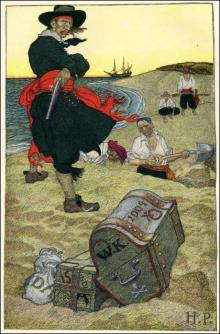 Howard Pyle's Book of Pirates
Howard Pyle's Book of Pirates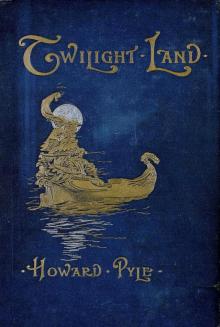 Twilight Land
Twilight Land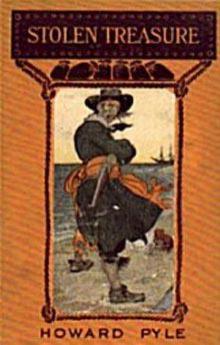 Stolen Treasure
Stolen Treasure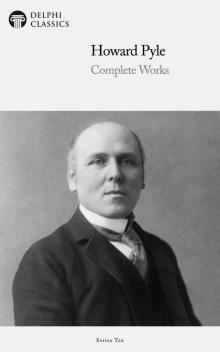 Complete Works of Howard Pyle
Complete Works of Howard Pyle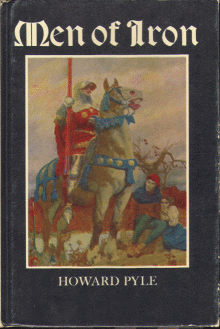 Men of Iron
Men of Iron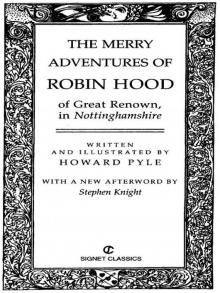 The Merry Adventures of Robin Hood
The Merry Adventures of Robin Hood The Wonder Clock
The Wonder Clock